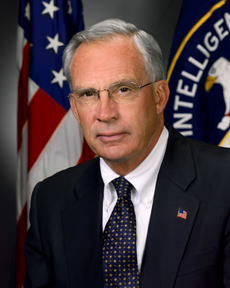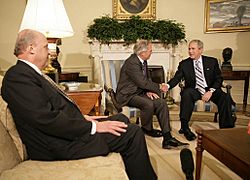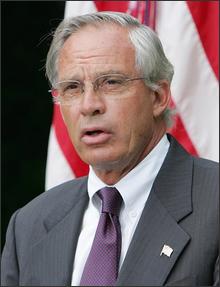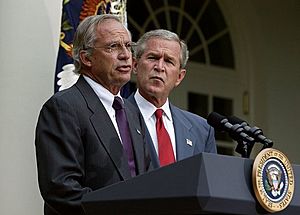Porter Goss facts for kids
Quick facts for kids
Porter Goss
|
|
|---|---|
 |
|
| 1st Director of the Central Intelligence Agency | |
| In office April 21, 2005 – May 5, 2006 |
|
| President | George W. Bush |
| Deputy | Albert Calland |
| Preceded by | Position established Himself (as director of Central Intelligence) |
| Succeeded by | Michael Hayden |
| 19th Director of Central Intelligence | |
| In office September 24, 2004 – April 21, 2005 |
|
| President | George W. Bush |
| Deputy | John E. McLaughlin |
| Preceded by | George Tenet |
| Succeeded by | Position abolished Himself (as director of the Central Intelligence Agency) John Negroponte (as director of National Intelligence) |
| Chair of the House Intelligence Committee | |
| In office January 3, 1997 – September 23, 2004 |
|
| Preceded by | Larry Combest |
| Succeeded by | Pete Hoekstra |
| Member of the U.S. House of Representatives from Florida |
|
| In office January 3, 1989 – September 23, 2004 |
|
| Preceded by | Connie Mack III |
| Succeeded by | Connie Mack IV |
| Constituency | 13th district (1989–1993) 14th district (1993–2004) |
| Personal details | |
| Born |
Porter Johnston Goss
November 26, 1938 Waterbury, Connecticut, U.S. |
| Political party | Republican |
| Spouse | Mariel Robinson |
| Children | 4 |
| Education | Yale University (BA) |
| Signature |  |
| Military service | |
| Allegiance | United States |
| Branch/service | United States Army |
| Years of service | 1960–1962 1962–1972 |
Porter Johnston Goss (born November 26, 1938) is an American politician who led the Central Intelligence Agency (CIA) from 2004 to 2006. He was the last person to hold the title of director of Central Intelligence (DCI). After a new law passed in 2004, he became the first director of the Central Intelligence Agency. This new role focused only on the CIA, while a new position, the Director of National Intelligence, was created to oversee all U.S. intelligence agencies.
Before leading the CIA, Goss was a Republican member of the United States House of Representatives for Florida from 1989 to 2004. He represented areas like Fort Myers and Naples. He also served as the Chairman of the House Intelligence Committee from 1997 to 2004. This committee oversees the nation's intelligence agencies. He also helped create the USA PATRIOT Act and worked on the investigation into the September 11 attacks.
Goss stepped down as Director of the CIA on May 5, 2006. President George W. Bush then nominated Michael Hayden to take his place.
Contents
Early Life and CIA Work
Porter Goss was born in Waterbury, Connecticut. He went to the Hotchkiss School and then to Yale University, where he studied ancient Greek and graduated in 1960. He also speaks Spanish and French.
While at Yale, Goss was recruited by the Central Intelligence Agency (CIA). The CIA is a government agency that collects information about other countries to protect the United States. He worked for the CIA's secret operations division from about 1960 to 1971. During this time, he worked in places like Latin America, the Caribbean, and Europe. He has mentioned working in Haiti, Santo Domingo, and Mexico.
Goss helped recruit and train foreign agents, and he spent a lot of time working in Miami. He was involved in the Cuban Missile Crisis in 1962, which was a tense time when the U.S. and the Soviet Union were close to war over missiles in Cuba. He said he helped with "small-boat handling" in the Florida Straits.
Later in his CIA career, Goss moved to Europe. In 1970, he became very sick in London due to a serious infection. He left the CIA in 1971 and moved to Sanibel, Florida. He returned to lead the CIA years later, and then retired from the agency again on May 5, 2006.
Public Service Career
After leaving the CIA for the first time, Goss moved to Sanibel, Florida. In 1974, he was elected to the City Council and later became mayor of Sanibel. In 1983, the Governor of Florida appointed him to the Lee County Board of Commissioners.
In 1988, Goss ran for Congress in Florida. He won the election and became a member of the United States House of Representatives. He served in Congress for 16 years, representing Florida's 13th and later 14th congressional districts. He was re-elected many times, often without much opposition, because his district was very supportive of Republicans.
In Congress, Goss generally held conservative views. However, he was also known for supporting environmental laws, which was different from many other Republicans. For example, he supported the Kyoto Protocol, an international agreement about climate change, and wanted to make the Environmental Protection Agency stronger.
Much of his work in Congress involved intelligence matters. He was the Chairman of the House Intelligence Committee from 1997 to 2005. He also helped create the USA PATRIOT Act, a law passed after the 9/11 attacks to help prevent terrorism. As a congressman, he strongly supported the CIA and pushed for more funding for the agency.
Career Timeline
- CIA employee: 1962–1971
- Mayor of Sanibel, FL: 1975-1977, 1981–1982
- U.S. Congressman for Florida: January 3, 1989 to September 23, 2004 (resigned)
- CIA Director: September 22, 2004 to May 5, 2006 (resigned)
Investigating the September 11 Attacks
In August 2001, before the September 11 attacks, Goss visited Pakistan with other U.S. officials. They met with leaders and intelligence officials there. On the morning of September 11, 2001, Goss was having breakfast with a Pakistani intelligence chief.
After the attacks, Congress decided to investigate what happened. Goss, along with Senator Bob Graham, led a special investigation called the Joint Inquiry into Intelligence Community Activities before and after the Terrorist Attacks of September 11, 2001. The goal of this inquiry was to find out where there were gaps in America's defense and how to fix them, not to blame specific people. Goss said they were looking for "solutions, not scapegoats."
The inquiry's final report was released in December 2002. It focused on the activities of the CIA and the FBI before the attacks. Goss believed that the CIA's problems were partly due to a lack of support from the previous presidential administration. He always strongly defended the CIA and its work.
Leading the CIA
After the previous CIA director, George Tenet, resigned in June 2004, President George W. Bush nominated Porter Goss to be the new director on August 10. Some members of the Democratic Party had concerns that Goss might be too political because of his past comments about Democrats. Others worried that his long history with the CIA might make him less likely to push for big changes within the agency.
However, the U.S. Senate Intelligence Committee approved his nomination, and on September 22, 2004, the Senate confirmed him with a vote of 77 to 17. Many Republican senators supported him, as did some prominent Democrats.
As CIA Director, Goss aimed to make changes within the agency. He believed that intelligence agencies should not be afraid to take risks to gather important information.
Stepping Down

On May 5, 2006, Goss's resignation was announced at a press conference with President Bush at the White House. The reasons for his sudden departure were discussed by the media. Some reports suggested there were disagreements about how the CIA should be managed and how its resources should be used in the fight against terrorism. Goss was replaced by Michael Hayden, a four-star Air Force General.
The idea of a Director of National Intelligence (DNI) had been discussed since 1955. The DNI's role is to coordinate all the different intelligence efforts across the U.S. government.
After the CIA
After leaving the CIA, Porter Goss became an active speaker. In April 2015, he registered as a lobbyist, meaning he represented the interests of Turkey to the U.S. government. He is also a member of the ReFormers Caucus of Issue One, a group that works on political reforms. He is also an organic farmer.
In July 2008, Goss was appointed as a co-chairman of the Board of the Office of Congressional Ethics, a group that looks into ethical issues for members of Congress. He served in this role until 2015.
In October 2022, Goss joined the Council for Responsible Social Media project, which aims to address the negative effects of social media in the United States.
See also
 In Spanish: Porter Goss para niños
In Spanish: Porter Goss para niños
 | James B. Knighten |
 | Azellia White |
 | Willa Brown |



